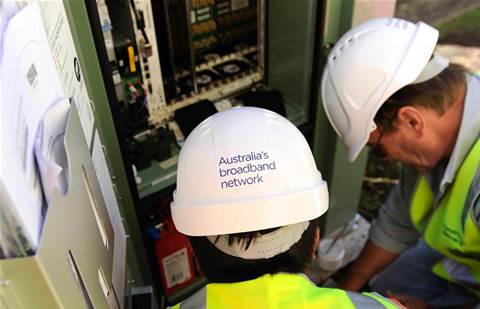The Australian Competition and Consumer Commission (ACCC) has taken Telstra, Optus and TPG to court for allegedly making false or misleading claims on some of the 50Mbps and 100Mbps NBN plans.
The claims were specifically about NBN Co’s fibre to the node (FTTN) connections, which still use part of the legacy copper network. FTTN has also consistently posted lower speeds compared to other NBN technologies, according to the quarterly reports from the ACCC.
The ACCC said the telcos made representations to some consumers on FTTN connections that they would test the maximum speed of their connections, notify the impacted consumer of their maximum speed if their line was underperforming, and offer remedies if the maximum speed was below their plan’s stated speed. The agency said telcos failed to do so for many customers.
All three telcos also allegedly accepted payments from some NBN customers when they were not provided with the advertised speeds.
“Telstra, Optus and TPG each promised to tell consumers within a specific or reasonable timeframe if the speed they were paying for could not be reached on their connection. They also promised to offer them a cheaper plan with a refund if that was the case. Instead, we allege, they failed to do these things, and as a result many consumers paid more for their NBN plans than they needed to,” ACCC chair Rod Sims said.
“Collectively, hundreds of thousands of consumers were allegedly misled by these three big internet providers, Telstra, Optus and TPG, which accepted payments for NBN speeds they could not provide.”
Sims added what was more concerning was that the telcos were all well aware of the issues and were given undertakings by the ACCC to compensate customers that have failed to get the promised speeds.
“We are very disappointed that these companies do not seem to have taken seriously the undertakings they gave to the ACCC,” Sims added.
The ACCC is seeking orders including declarations, injunctions, pecuniary penalties, publication orders and the implementation of compliance programs.
Optus and TPG acknowledged the agency’s decision, saying that NBN Co’s FTTN connections are unable to match the speeds of other NBN technologies and therefore the service won’t be consistent across all customers.
“Optus acknowledges the ACCC's decision to commence proceedings today and we are carefully considering this matter. As acknowledged by the ACCC, we have been contacting impacted customers to offer appropriate remediation options,” an Optus spokesperson told CRN.
“The speed that is achievable on some NBN connections can be impacted by issues including the length and quality of the copper line that connects a customer to the NBN. Unfortunately, not all NBN connections can deliver the same speeds.
“Optus will continue to work to measure NBN speeds and inform customers of the options that are available to them.”
TPG issued an apology through a media statement sent to CRN:
“We will be making things right with the impacted TPG Internet customers who didn’t receive a notice about the maximum attainable speed (MAS) of their NBN service. For the oversight, we are sorry,” A TPG spokesperson said.
“There were two key contributing factors to this issue. The first was failure by NBN Co to provide timely and accurate speed information to TPG Internet. The second was anomalies in TPG Internet’s legacy processes in place since 2017, and these have been fixed post-merger.
“We will be contacting the impacted TPG Internet customers and will offer them the option to move down a plan and receive a refund, leave and receive a refund or stay on their current plan.”
TPG added that there was no intention to avoid obligations and that its processes were intended to provide the correct MAS information to customers. The company claims only a small percentage did not receive the required MAS information.
CRN has contacted Telstra for comment.
How telcos advertised NBN speed reporting
The ACCC said the allegedly false and misleading statements were running on Telstra’s and TPG’s websites and email campaigns from 1 April 2019 to 30 April 2020, while Optus ran theirs from at least 1 January 2019 and 31 December 2019.
The regulator also alleged that all three didn’t have adequate systems in place to implement the speed checks, notifications and remedies promised. The investigation was prompted by Telstra self-reporting to the ACCC and through the agency’s Measuring Broadband Australia Reports.
Telstra’s advertisements said that it would test the line speed 21 days after connection and promised consumers the following:
“If your NBN connection doesn’t allow you to properly benefit from the speed tier you’re on, we’ll provide you with a maximum line speed, once it’s available, along with alternative options.”
Optus also promised to check speeds and that “options would be provided if the actual speed you achieve is lower than what’s included in your plan or speed pack”.
TPG also said it would email consumers their line speeds “around three weeks after activation” and that consumers would “have the option to move to a lower speed plan (if available) or to change providers without contract break fees”.
Sims added, “Internet speed is one of the main features consumers look for when choosing their NBN plan, but it can be complex, confusing and time-consuming for them to understand the features of advertised NBN services and they cannot check their maximum speed themselves.”
“It is important that internet providers like Telstra, Optus and TPG give their customers accurate information so they can make an informed choice about the service that best suits their needs and budget.”
“We are pleased that Telstra, Optus and TPG have promised to compensate consumers even before the court case is finalised.”
The three telcos are contacting current and former customers who are affected on possible refunds, if they can be moved to different plans or if they want to terminate their contracts without penalty.
Examples of the telco advertisements can be found on ACCC's announcement.




.jpg&h=142&w=230&c=1&s=1)


.png&h=142&w=230&c=1&s=1)




.jpg&w=100&c=1&s=0)
_(8).jpg&w=100&c=1&s=0)











